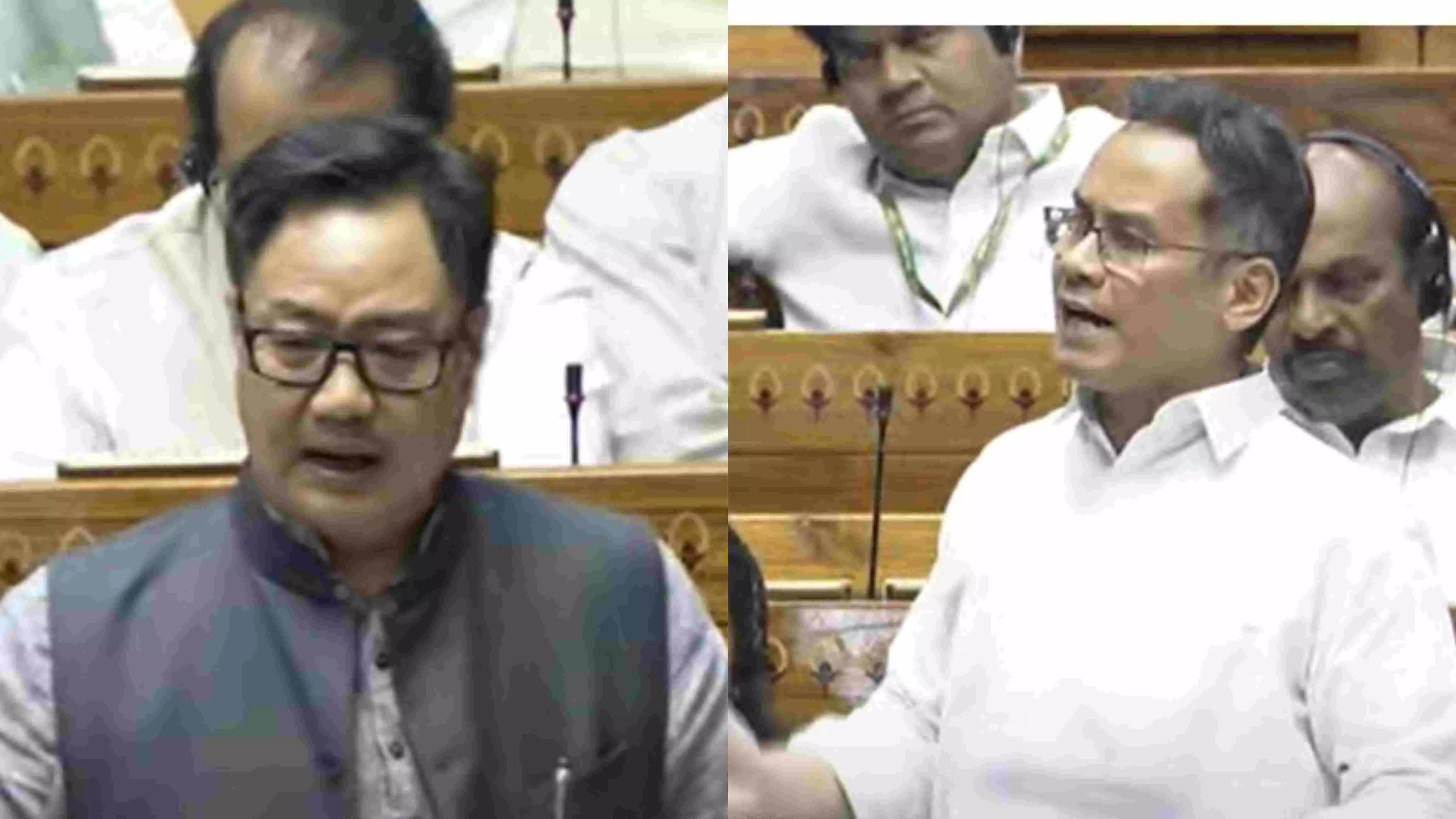Union govt defends Waqf bill, Opposition alleges constitutional violations
Heated debate in Parliament over Waqf bill as govt highlights benefits, Opposition calls bill unconstitutional
By Kaniza Garari
New Delhi: Waqf Amendment Bill MP's Kiren Rijiju and Gaurav Gogoi in Parliament
Hyderabad: The Waqf Amendment Bill’s discussion in the Parliament has the ruling Union government listing the bill’s various benefits even as the Opposition is terming the bill anti-constitutional.
India has the largest Waqf properties in the world with 8.72 lakh Waqf properties. Disputes and pending cases in court regarding Waqf properties are around 30,000, according to the report in Parliament.
Minority affairs minister Kiren Rijiju presented the bill in the Parliament, stating that long pending issues about Waqf assets will be addressed by the bill, such as:
- Lack of transparency in Waqf property management
- Incomplete surveys and mutation of Waqf land records
- Insufficient provision for women’s inheritance rights
- Prolonged litigations
- Irrational power of Waqf boards in declaring any property as Waqf land based on their own inquiry
- A large number of disputes related to government land declared as Waqf
- Lack of proper accounting and auditing of Waqf properties
- Administrative inefficiencies in Waqf management
- Improper treatment of Waqf properties
- Inadequate representation in State Waqf boards
The Union government said the Waqf Amendment Bill will benefit people in:
- Transparency in Waqf management with digitisation to curb corruption
- Legal Aid and social welfare
- Cultural and religious identity
Section 40 of Waqf Act to be scrapped
The Waqf (Amendment) Bill, 2024, tabled in the Lok Sabha, sought to scrap Section 40 of the Waqf Act.
The section allows the Waqf boards and the tribunal to declare any land as Waqf property. Minority Affairs Minister Kiren Rijiju called it the ‘most draconian’ provision, alleging it was misused for mass land conversions. The new bill allows these decisions to be challenged in court.
‘Anti-Muslim and anti-constitutional, says Opposition’
The Opposition has termed the bill as anti-Muslim and called it anti-constitutional. Deputy leader of the Congress Gaurav Gogoi detailed the anti-constitutional provisions in the bill. A list of crucial aspects that the bill’s provisions violate:
- Violation of Article 26
By giving a State government officer the power to decide Waqf disputes (Sec 3C), the government is bulldozing Waqf board autonomy, a direct interference in religious affairs and a violation of Article 26 of the Constitution.
- Forced ‘inclusion’ of non-Muslims in Waqf board violates Article 30
The bill mandates two non-Muslim members in Waqf boards (Sec 9, 14). This provision reeks of majoritarianism. Imagine demanding Muslim members in the Ram Mandir Committee?
Article 30 guarantees minorities the right to self-manage their institutions; this bill destroys that autonomy, the Opposition said.
- 5-year loyalty test to create a Waqf
The bill states that only Muslims who have practiced Islam for five years can endow property (Sec 3(r)). Since when does the State decide who is a ‘real’ Muslim?
This violates Article 14 (arbitrary classification) and Article 25 (state dictating religious practice).
- Removal of ‘Waqf by user’, killing centuries-old tradition
The bill abolishes Waqf by long-term use (Sec 36(1A)), demanding formal deeds instead. This erases a historical custom rooted in Muslim personal law.
Article 29 protects minority traditions. The opposition asked, “Why is the BJP hell bent on rewriting religious jurisprudence?”
- The bill forces Central control over State regulations
The bill mandates a centralised digital portal (Section 3B) for Waqf property registration, stripping States of their traditional record-keeping systems. This bill also mandates only six months for the registration of properties on the Waqf portal.
This not only violates State autonomy (Concurrent List, Entry 28) but also Babasaheb’s vision of federal democracy.
The real agenda behind the bill is a Waqf land grab, alleges opposition
Sec 3C of the bill allows State government officers to declare Waqf properties as government land based on vague inquiries. With no clear criteria, this is a recipe for mass dispossession, the Opposition said.
This means thousands of waqf-run schools, mosques and hospitals could be seized overnight, the statement read.
According to the Opposition, with a single stroke, the Union government intends to scrap multiple Constitutional provisions like:
- Religious freedom (Articles 25-26)
- Minority rights (Articles 29-30)
- Federalism (Article 246)
- Equality (Article 14)